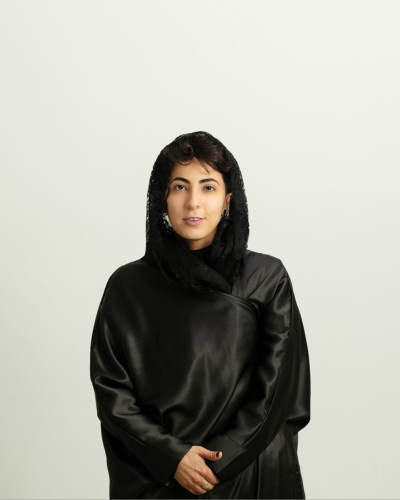
Njoud Alanbari
Njoud Alanbari, born in 1989, is a conservation architect who considers herself not only a practitioner but also a student of nature. Her journey in architecture has been deeply influenced by her fascination with how spaces shape human behavior, and she views creating as a powerful tool to interact with reality, exploring both the tangible and intangible aspects of design.
Her passion for architecture led her to pursue a Bachelor's degree in Interior Architecture, which she completed in 2014. Following her studies, she joined the Ministry of Culture, where she played a key role in executing designs for various cultural heritage museums on a regional level. This experience heightened her interest in preserving cultural heritage and led her to join TBC Tatweer Building Company, a semi-government entity in Riyadh, Saudi Arabia. At TBC, she served as a project manager in the design department, contributing to educational projects such as schools and kindergartens.
Throughout her work in the educational field, Njoud realized the importance of capacity building as a foundation for her career aspirations. As a result, she pursued her master's studies in Architecture and Urban Restoration at Politecnico di Milano in Italy, graduating in October 2019 after completing her thesis on Dumat AlJandal in AlJouf Northern Reagan, Saudi Arabia.
In June 2020, Njoud joined the Ad Diriyah Gate Development Authority as a Conservation Architect, where she became deeply involved in managing cultural heritage sites, particularly focusing on At Turaif UNESCO site and its buffer zone. As her mandate expanded in 2022, she also started working on the Cultural Landscape of Wadi Hanifa, exploring its various elements and significance to the Saudi Nation.
What captivates Njoud about her work is the use of mud as a building material, which allows for diverse architectural typologies, ranging from simple farmhouses to grand palaces. This humble yet versatile material resonates with her holistic approach to design, harmonizing with humanity's connection to nature. Her enthusiasm for her work is evident in her engagement with the audience, inviting them to become an integral part of the projects she undertakes.
Njoud's thinking process is characterized by its multidimensional nature, exploring various directions and perspectives in design. She deeply values chronology and atmosphere, which play a significant role in understanding the transformative re-compositional aspects of her projects. Investigating humanities' adaptations expressed through physical evidence guides her in crafting meaningful and engaging spaces that bring joy to those who experience them.
Her commitment to preserving heritage and promoting sustainable architecture led her to participate in a prestigious month-long course with the Getty Conservation Institute about earthen architecture in Al Ain, UAE, and Oman. The course provided her with invaluable insights into historical sites and management plans, enriching her approach to conservation.
Njoud feels honored to contribute to her country's evolution and transformation by showcasing its rooted heritage. As a conservation architect and advocate for nature-inspired design, she continues to push the boundaries of creativity and responsibility, leaving a lasting impact on Saudi Arabia's architectural landscape.






